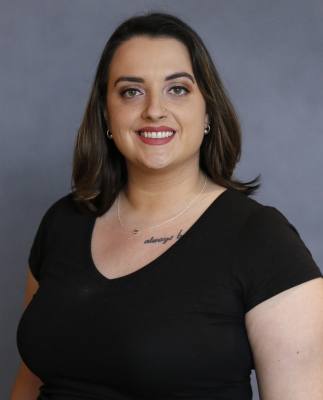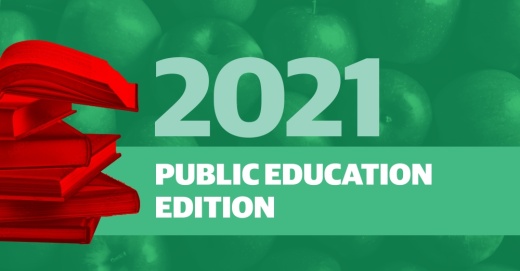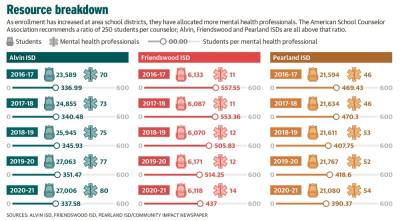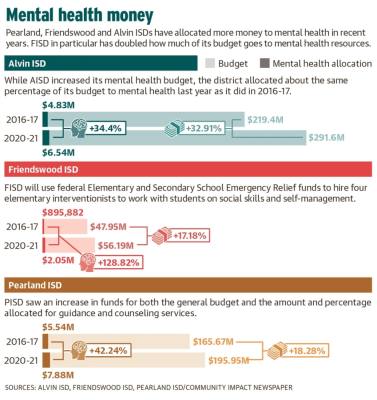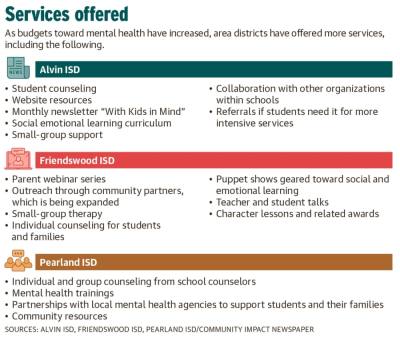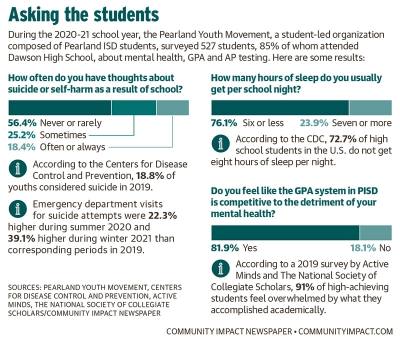One Pearland ISD student said rigorous courses, such as in Advanced Placement, are part of a toxic competitive culture at PISD. For a number of PISD students, keeping their GPAs and class rankings high is made tougher by the district’s competitive system, said Alice Murphey, Dawson High School student and executive director of the student-led Pearland Youth Movement.
“I think it’s just a point system that is very hard to deal with,” Murphey said.
Pearland, Friendswood and Alvin ISDs deal with AP course- and GPA-induced stressors, and they are taking efforts to address these mental health challenges, officials said. For instance, FISD administrators are redefining student success, which includes expanding resources for social and emotional learning as well as providing individualized educational pathways, FISD Superintendent Thad Roher said.
Social and emotional learning, or SEL, is defined as the processes that help develop the self-awareness, self-control and interpersonal skills necessary to succeed, officials said.
School-age children’s levels of social anxiety, depression and suicidal ideation have increased during the pandemic, said Angela Koreth, a child and adolescent counselor at The Menninger Clinic. Koreth said The Menninger Clinic, which provides treatment for mental health disorders in Houston, saw rates of anxiety and depression among inpatient adolescents increase approximately 35%.
“For adolescents, there’s been an increase in suicidal ideation and grief and trauma,” Koreth said.
Most Houston-area students will return to school face-to-face in the fall. Koreth said this will be an adjustment for some students, further exacerbating issues such as social anxiety.
“Social and emotional learning has become as important as the academic learning for students for Friendswood and all school districts,” Roher said in an email. “The stressors on families and students continue to increase, and with the pandemic, I believe they have doubled in many instances.”
GPA-induced stress
Students and staff at each district said the pressures of comparison factors such as class rank and GPA have an effect on which courses students take as well their stress.
At PISD, the class ranking for each student is determined by averaging the semester grade points from all semesters of high school. Students who take AP courses have the opportunity to earn higher GPAs than those who do not because AP courses are weighted more heavily, Murphey said.
To maintain a high class rank, many high-achieving students feel pressured to take several AP courses to boost their GPAs, but Murphey said this leads to students feeling overwhelmed.
“The work piles on, and you’ll end up having hours upon hours of homework per night,” she said. During the 2020-21 school year, Pearland Youth Movement surveyed 527 PISD students, most of whom attended Dawson High School. More than 81% of students said they felt PISD’s GPA system was detrimental to their mental health. Chenda Moore, the district’s coordinator of guidance services, said a committee is addressing the GPA and class rank concerns, which is a topic the district has visited before.
“The committee met with a group of high school students recently to obtain their thoughts as well,” she said. “I encourage students to take courses that meet their interests and postsecondary goals.”
Meanwhile, FISD’s board of trustees voted in the spring of 2019 to remove class rankings throughout the district, and administrators will begin another phase of evaluation with GPA scales this fall, said Kim Cole, FISD’s executive director of secondary teaching and learning.
Class rank is now reported to only the top 10% of students because they are eligible for automatic admission to any public university in Texas. Results have been even better than anticipated since emphasis was moved away from class rank, Cole said.
“When you put [students] in a rank, that’s comparing one student to another, and that’s what we wanted to remove: the stress of having to be compared to other people,” she said.
AISD’s GPA system is also on a weighted eight-point scale, according to AISD documents. Community Impact Newspaper was unable to reach an AISD official to comment on the GPA system before press time.
Grades for after graduation
The importance put on students’ class rank ultimately derives from their hopes to succeed after high school in college or careers, Murphey said.
However, an admissions expert at University of Houston-Clear Lake said some students get too wrapped up in the numbers. From a college admissions standpoint, grades are just one part of the equation, said Kara Hadley-Shakya, UHCL’s executive director of recruitment and admissions. While finishing with a high GPA or class ranking will help students’ college admissions, Hadley-Shakya said it is also important for a student with a specific pathway in mind to stay on track with the college prep and application process for their program.
“An important part of preparing for college is understanding what academic program the student wants to pursue and making sure they have the prep courses for that major,” she said. At UHCL, the standard admissions criteria for freshmen does not involve looking at GPA, Hadley-Shakya said. Criteria is instead based on class rank or SAT or ACT scores, and any students meeting these criteria are admitted.
Data from the Texas Higher Education Coordinating Board shows more FISD graduates attended Texas A&M University, the University of Houston and The University of Texas between 2019 and 2020. This means there has been an improvement in admission statistics for students outside the top 10% for competitive colleges and universities, Cole said.In PISD and AISD, board data showed fewer students attended Texas A&M, UH and UT in 2020 than in 2019.
Students’ well-being
PISD, FISD and AISD data shows the districts expanded the mental health resources available for students in the past few years.
Both PISD and FISD allocated a larger percentage of their budget to mental health services, such as counseling and group therapy, from 2016-17 to 2020-21. Detailed budget information for 2021-22 is not yet available for either district.
While the percentage of funding allocated to mental health services in AISD remained about the same from 2016-17 to 2020-21, Sarah Chauvin, AISD’s director of special needs, said the district focused last school year on addressing students’ needs.
“Our academics department has been ... looking at the state standards, making sure teachers are equipped and addressing the standards that need to be addressed,” she said. “We are always mindful.”
All PISD campuses have counselors trained to handle mental health issues, Moore said. All junior high and high school campuses also have additional student support counselors who provide individual and group counseling, particularly as it relates to stressors students experience.
“All students are encouraged to seek out their school counselor for academic and mental health support,” Moore said.
The challenges of education amid a pandemic underscored the necessity at FISD to continue the SEL work administrators had started with the strategic plan, said Abygail Kinard, Friendswood High School’s student support counselor.
“Typically, mental health crisis spikes in the spring and in the fall, so we want to be able to identify those crisis events,” Kinard said.



